VACATION RENTALS: License to Kill the Golden Goose?
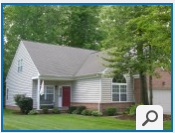
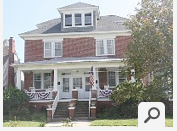
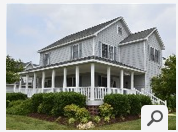
By GEORGE SOUTHERN
Cape Charles Wave
October 7, 2013
According to Cape Charles merchants, this year’s tourist season was the best in memory. But if Town officials enforce their vacation rental rules, they could kill the goose laying the golden eggs.
Cape Charles has five bed-and-breakfasts with 18 bedrooms, and two hotels with 22 rooms, for a total of 40 rooms offered to the public. Those 40 rooms obviously are not the anchor for tourist accommodation in Cape Charles. Families, often staying a week or longer, rent whole houses, and in almost every case these homes are privately owned.
According to a report compiled by former Town Planner Tom Bonadeo, the Town is comprised of 958 houses, of which 402 are used for vacation rentals. Without these individually owned properties, the Cape Charles tourist trade would hardly exist. But Town policies, if enforced, could decimate this cottage industry.
For an example of a Town that has successfully discouraged private vacation rentals, one need look no farther than Chincoteague. Even though Chincoteague hosts multiples of tourists more than Cape Charles, the number of private vacation homes for rent in Chincoteague is only a small fraction of those in Cape Charles.
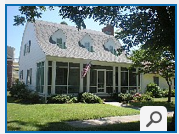
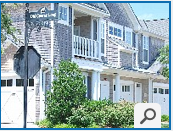
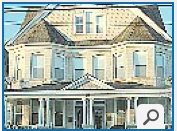
Why? Perhaps because Chincoteague has enacted a very restrictive ordinance: private houses offered for vacation rental are required to provide one off-street parking space for each bedroom in the house. And the parking spaces cannot be in the front yard. That severely restricts rental opportunities for homeowners, but it doesn’t hurt the tourist business as a whole, because Chincoteague has a Best Western, a Hampton Inn, a Rodeway Inn, Comfort Suites, and many, many more condos and villas. Perhaps commercial innkeepers don’t want competition from private homeowners, and the Town of Chincoteague appears to have accommodated their wishes.
CONTINUED FROM FIRST PAGE
In Cape Charles, the Town has enacted a one-parking-space-per-bedroom rule for B&Bs. Two of the B&Bs are exempt, however: Sea Gate Inn, owned by Vice Mayor Chris Bannon, and Cape Charles House, owned by former Town councilman Bruce Evans. Because those two B&Bs were in existence before the parking ordinance was passed, they are grandfathered.
The two hotels in Cape Charles, however, are not required to provide any parking for guests – Mason Avenue is fair game.
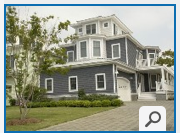
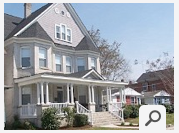
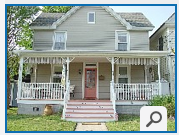
Although no one is talking about requiring off-street parking for vacation rental houses, Cape Charles has recently tried to enforce another onerous policy that could put a damper on owner rentals. The Town now requires that every house owner offering short-term rentals procure a Town business license and pay a tax on rental proceeds.
Typically, homeowners who rent their houses do not think of themselves as operating a business, but the town, county, and state think otherwise – if the rentals are short-term. Under Virginia law, renting one’s house for a period of less than 30 days makes one an innkeeper, with all the responsibilities that word includes.
The Town of Cape Charles takes it a step further, and says any rental less than 90 days requires a plethora of documentation, including a business license.
But how many of the 402 vacation rentals have a business license? According to Town records, only 15 business licenses have been issued for vacation rentals, and that includes the five B&Bs. Subtract them and there are 10 – of which five are held by rental companies (Bay Creek LLC, Shore Living Properties, Cape Charles Vacation Rentals, Chesapeake Properties, and The Pinnacle Vacation Rental at Bay Creek). That leaves five privately owned rental properties in compliance with the Town business license regulation.
But what about private owners who pay a property manager to rent their house? Are they required to obtain a business license? According to the Town treasurer, “most likely, the Town will be requiring the property owners of these rental properties to obtain business licenses as well.”
The reason is due to a “loophole” in the business license tax. Individual owners are required to pay tax on their gross earnings, but if they employ a property management firm, the company pays tax only on its commission – typically 10 percent. So an independent owner is paying 10 times as high a license fee as an owner using a property manager.
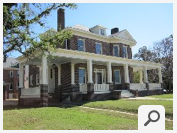
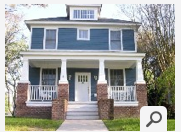
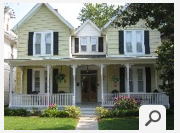
Readers considering making their Cape Charles residence “pay for itself” as a vacation rental are required to do the following, or risk committing a class 1 misdemeanor:
1. Obtain a Rental Certificate of Occupancy ($50) after passing a safety inspection.
2. Purchase a business license by April 15 at a cost of 36 cents per $100 of gross receipts. That means the tax is due for the entire year before the tourist season even begins – and not just on profit (if any) but rather gross income.
3. Declare annually all personal property in the dwelling, and pay 3.85 percent County personal property tax and 2 percent Town business tax.
4. File with the Commonwealth of Virginia to pay 5.3 percent Virginia sales and use tax, to be collected from renters. A tax form must be filed every month with the state, even if no proceeds were collected that month. There is a penalty for late filing.
5. Repeat #4 for the Town of Cape Charles, this time remitting 3 percent occupancy tax. Again, the form is due by the 20th of each month, whether or not any tax was collected. Penalty for late filing.
6. Repeat #4 for Northampton County, remitting 2 percent occupancy tax. This need be done only quarterly instead of monthly, but there is still a penalty for late filing.
7. At income tax time, declare gross income, calculate depreciation, and show all expenses on their various schedules. Under law, a Form 1099 must be prepared for every person contracted to work at the house, such as household cleaners. Any regular employees generate all the paperwork involved with payroll tax, FICA, unemployment tax, etc.
8. Repeat portions of #7 for the State of Virginia.
Not included above is the additional payment of Town and County real estate taxes, which are levied on all properties whether rented or not.
So, according to Town records there are 402 houses offered for vacation rental, five of which have business licenses. If the Town bears down on the owners of the other 397 houses, how many will decide that renting their house is just not worth the hassle? And if such a scenario plays out, what does it mean for the Town’s tourist industry?
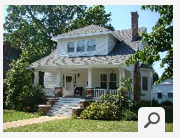
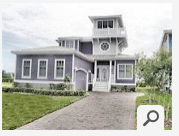
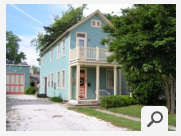




















Encourage growth, don’t hinder it. Otherwise just roll up the sidewalks and shut the town down.
A key issue is who the town has chosen to enforce the “business license” against. Are these people who have “made waves” or bothered the town in some way? Is there arbitrary enforcement? If less than 1% of owners have the license, this would seem on its face to be the situation. Strange that two properties exempt from the parking regulations belong to current or past town politicos.
Another important article from the Wave!
Thanks for bringing this to the attention of the powers that be. Now the town minions will be all over the renters to collect tax money.
It should be don’t ask, don’t tell!
Actually the purpose was to bring to the attention of the public that the Town HAS started to crack down on vacation rentals. –EDITOR
These comments are intended to correct some information presented in this article. First, Tom Bonadeo’s report was referring to houses in the Town that are not occupied full time. The houses his report references may be either empty all the time, used as vacation homes by the owner periodically, or rented as short term vacation rentals (this information is readily available from the US Census). Therefore, the 402 homes referred to in the article are not all vacation rentals. The actual number listed for Cape Charles on the Homeaway.com website, the dominant aggregator of vacation rentals, is 121, and about 21 of those are not actually within the town limits of Cape Charles. So, there are 100 vacation rental homes in Cape Charles. Homeaway lists 61 properties for Chincoteague; therefore Chincoteague has only 39 fewer vacation rental homes than Cape Charles. I don’t think you can draw much of a conclusion from a difference of about 39 properties without a great deal more research.
Second, the article stated that the commission rate for managing short term or vacation rentals is 10%. Actually, the commission rates range from about 17% to 23%.
Third, related to the insinuation that there was something underhanded in the fact that two B&B’s are grandfathered with regard to the parking requirements, both of those B&B’s were permitted before the parking requirement was enacted. It is common practice that when a new or revised code would render a property non-compliant, the property would be grandfathered with conditions.
Additionally, if the Town began to enforce the business license, it would amount to no more than $50 or $60 a year for a vacation rental. The County calculates the personal property tax assessment on vacation rentals at the rate of $500 per room not counting bathrooms. On a 7 room house, the tax would amount to about $135 per year. All rental properties are required to have periodic Occupancy Permit inspections, both long term and short term.
Property managers for vacation rentals typically collect both Town and County occupancy taxes and State sales taxes and remit them to the proper agencies relieving the owners of those tasks and bookkeeping chores.
GEORGE SOUTHERN RESPONDS — Mr. Little’s expert commentary is always appreciated. The figure of 402 vacation rental houses indeed seems too high, but that was the figure stated at the August 19, 2013, meeting of the Cape Charles Planning Commission, the minutes of which may be read here (see page 3): http://www.capecharles.org/documents/20130910-PCMtgAgendaPkt.pdf
The relevant quote is: “Bill Stramm read from a report compiled by the former Town Planner Tom Bonadeo which stated that the Town had 958 houses, 516 of which were occupied by full-time residents. 442 were unoccupied full-time but 402 of them were vacation rentals.”
The number of vacation rentals advertised at homeaway.com is a good indicator, but by no means is every Cape Charles rental advertised on that website. Bay Creek Realty (http://www.baycreekresort.com/resort/vacation-rentals/search/)
lists 37 homes for vacation rental, only a few of which are also advertised on homeaway.com. Other properties may be found listed exclusively on the websites of the five local vacation property managers listed in the story above. And some other properties in town rely on word of mouth and do not advertise at all.
Regarding Chincoteague, we continue to believe it is relevant that a town with perhaps 10 times the rental business of Cape Charles nevertheless advertises 1/3 fewer owner-owned homes for rent on homeaway.com than in Cape Charles.
Our story did not intend to insinuate anything “underhanded” about the grandfathering of B&Bs owned by current and former members of Town Council. The story simply stated: “Because those two B&Bs were in existence before the parking ordinance was passed, they are grandfathered.”
Mr. Little writes, “IF the Town began to enforce the business license. . . .“ In fact, that was the point of the whole story, which in retrospect should have been better emphasized. The Town IS now trying to enforce the business license requirement on homeowners. The Town has mailed letters to property owners believed to be renting their houses, stating: “If your property is a short-term rental (i.e. weekly rental) you are required to obtain a Cape Charles Business License through the Treasurer’s Office.” And the minutes of the August 15, 2013, Town Council meeting report “an ongoing collection effort to obtain unpaid business license taxes.”
I wish to comment to the parking space requirement. Obviously, B&B’s, etc. need loading and unloading spaces for their guests. That’s common courtesy. I think a bigger issue is the parking of visitor cars who come to town (not to partake in our eateries or to browse and buy at our shops) to use the well-publicized public beach and fishing pier. They park along the beach front and when it’s full, they park in the neighborhood taking up spaces from residents and paying renters.
Personally, I don’t know of any, Mid-Atlantic town-limit beach, which offers free parking. Many have paid lots or parking kiosks. Cape Charles should implement the automated cash/credit card kiosk concept for daily beach visitors, with three units installed (at each end and one mid-way). Residents would have a local sticker which exempts them from paying and perhaps a visitor pass for guests who come to see them. Renters, hotel or B&B guests could have a windshield permit issued when they check-in and retrieved when they checkout. The parking proceeds could help to pay the costs of maintaining the beach and the town in general. Local law enforcement could ticket those parked along the beach or in town without a sticker, windshield permit or kiosk parking stub, also earning revenue for the town from those who fail to participate.
Oh! I’ve heard the protests which declare, “that would keep visitors away and the businesses would suffer.” As a former small business owner, I can attest to the fact that the majority of beach visitors are not visiting your businesses. They are sunbathing, swimming, playing in the sand or fishing.
Wake up Cape Charles and run this place like a real town and benefit from the experiences of other beach communities who have, and continue to prosper.
Great idea, Linda. That would clear up the congestion and create revenue for the town. As an East Side dweller, it would provide me with an incentive to walk to see the sunset, rather than do a quick drive by and pollute the environment.